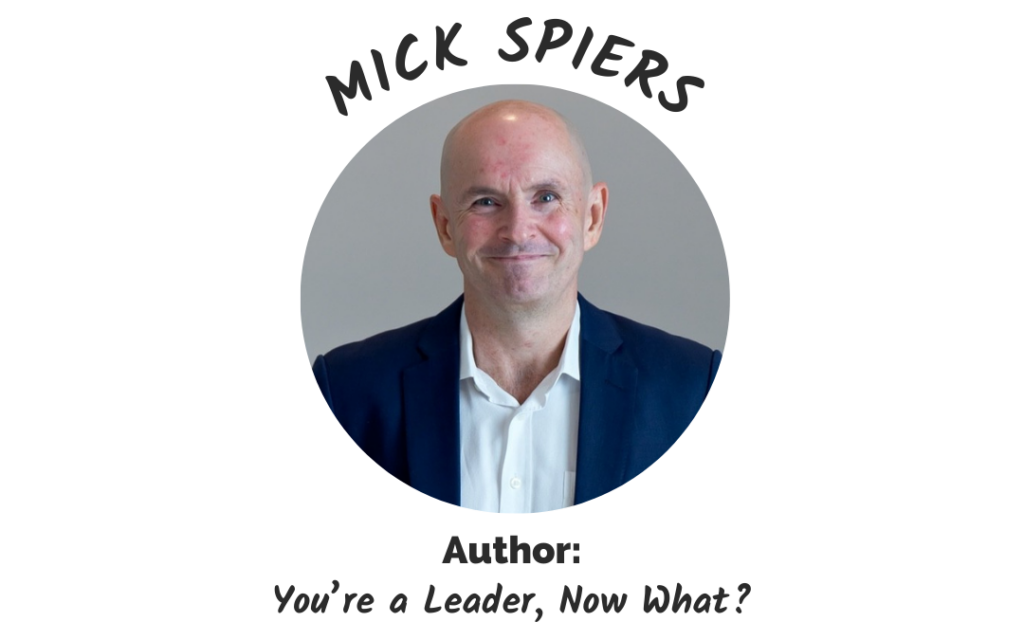In this episode of Transform Your Workplace, Brandon Laws and guest Mick Spiers, founder of The Leadership Project, discuss Mick’s new book, You’re a Leader, Now What?. Get a glimpse into revolutionary leadership-development methods for transitioning from contributor to leader in the workplace and build effective leadership habits through applied learning.
GUEST AT A GLANCE
Mick Spiers is the founder, and principal of The Leadership Project and the best-selling author of You’re a Leader, Now What?: The Proven Path to High-Performance Leadership. With extensive experience in developing leaders and teams, Mick keeps purpose and meaning at the forefront of everything he does.

A QUICK GLIMPSE INTO OUR PODCAST
🔊 Podcast: Transform Your Workplace, sponsored by Xenium HR
🎙️ Host: Brandon Laws
📋 In his own words: “The Transform Your Workplace podcast is your go-to source for the latest workplace trends, big ideas, and time-tested methods straight from the mouths of industry experts and respected thought-leaders.”
FROM CONTRIBUTOR TO LEADER
Are people typically ready to move from a contributor to a leadership role? According to Mick Spiers, author of You’re a Leader, Now What?, the answer is “a definite no, and it’s not their fault.” More emphasis needs to be placed on the leadership preparation stage instead of throwing contributors into leadership roles without adequate training.
New leaders often experience a rollercoaster of emotions. They were successful in their contributor role, and due to that success, they’ve been promoted to a leadership role. With the recognition of all of their hard work comes “euphoric highs.” However, not long after, many contributors-turned-leaders experience anxiety “when they realize that no one has actually taken the time to show them what it means to be a leader.” Sure, some may be able to navigate those tricky waters quickly, but many begin to question themselves and develop Imposter Syndrome. “They start wondering whether leadership is even for them,” Mick said.
Luckily, Mick Spiers’ The Leadership Project is all about empowering the next generation of successful leaders.
PODCAST EPISODE HIGHLIGHTS
The Mindset Shift
“The first thing is the mindset shift — to quickly realize that what got them to where they are now is not going to serve them well in their next trial. They think, ‘I got here because I’m good at my job, so I need to be continuing to do my job.’ And you see many of them reaching back to their comfort zone. […] They still do large chunks of their own job in a very hands-on role instead of realizing that their job now is to create an amazing environment where their team can be nurtured and to give their team the opportunities to knock it out of the park.”
A New Skill Set
“Beyond the mindset shift is the knowledge and the skills. So no one has actually sat down and spoken to them about that. Right? So now your job is to create an amazing environment to give people purpose and meaning, to let them have their voice, to listen and respect their opinions, and to treat them like they matter. So no one sits down and says that leadership is more about how you relate to other people. It doesn’t matter what you know anymore. It’s more about how much you care about those people.”
Time for Self-Reflection
“You need to test your motivations. If you are taking that leadership role just for the paycheck, then that’s not a good signal. If you’re taking it for fame and fortune, because you want to be put up on some kind of pedestal and be this amazing leader who — for I’m gonna call it ‘narcissistic reasons’ — wants applause, that’s the wrong reason. But if you’re doing it because you believe in people and that you want to help other people to unlock their best version of themselves, then you’re in it for the right reason.”
When a Leader is Ready to Quit
“Tell them that what they’re going through right now is normal. Most new leaders go through this journey, but […] paint them that picture, that vision of what they could become as a leader. The more transformative part is that self-reflection — get them to really look inside themselves and think about leaders that they’ve had in the past to get them to discover what really works. If you sit there and just teach them — okay, do this, do this, do this, do this — they’ll remember it for a period of time and while it suits them. But if they discover the leader within themselves through smart and clever questioning and coaching, they usually have a much more transformative effect and accelerate through that rollercoaster phase much faster.”
Nature or Nurture?
“All of the skills of leadership can be trained and learned. Some people may pick them up quicker due to natural preferences and natural personality, but every single leadership trait can be taught, learned, and discovered. What can’t be taught is whether you want it or not. So coming back to what I said before about having the right motivations — that needs to come from within. You might not have that today, but it might develop over time for you to have those right motivations. Then the skills — everything from emotional intelligence to having clarity of purpose, having amazing communication skills, which starts with things like active and deep listening, the ability to express yourself with clarity, the ability to understand things like the psychology of the culture of your team — all of these things can be trained.”
A Failing Approach
“I’m gonna get controversial here for a second. Our traditional approach to leadership development is broken. […] So the typical approach is someone gets sent on a five-day leadership retreat. They’ll go away. They’ll have a great time. They’ll be bombarded with information. They’ll be drinking from a fire hose for five days straight.
They have a great shared experience with their other team members. […] But on the following Monday, when they go back to work, nothing happens. They don’t know how to put it into practice.”
Building Good Habits
“At The Leadership Project, we are flipping that on its head, and we’re embracing concepts of collaborative or social learning to get people talking, to get people reflecting. We practice micro-learning, and we practice gamification. So for those out there that are looking to develop your leadership skills, you can call it habit-building.
Work on one thing at a time, go and do a module on a topic, and then immediately put it into practice and see what happens with your team before you learn anything else.
Then, do the next module, and then go and put it into practice. You’re always learning, but it’s not the learning that’s important. It’s the applied learning.”
LEARN MORE
Find Mick Spiers’ book, You’re a Leader, Now What?: The Proven Path to High Performance Leadership, on Amazon or check out some powerful leadership resources here.
